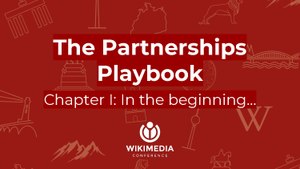Wikimedia Conference 2018/Program/11
11. New Beginnings: how to establish a new partnership (The Partnerships Playbook: Chapter I)
[edit]How to move forward
[edit]- What was this session about?
This session was about starting a new partnership from scratch and included participants working on their example partnerships.
- What are the next steps to be taken?
The slides of presentation below include documentation gathered at the session. Everyone is welcome to use described steps and tactics in their activities.
- Photos
- Slides
- Speaker(s)
Julia Kirchner (Wikimedia Deutschland), Jorge Vargas (WMF)
- Length (min)
120 min
- Audience / Target group
Anyone who would like to learn more about how to start lasting partnerships
- Session Format
Workshop for participants to apply selected tools in small groups.
- Description
The first in a series of three workshops will address the many questions that arise when we are seeking or embarking on new partnerships:
- How to be well perceived, professional and recognizable?
- How do we identify new partners?
- How do we choose the right partnerships?
- How do we best approach new partners, and how do we ’hook’ them?
- How do we identify common interests, assets and values for a win-win-win partnership?
- How do we maintain our identity and mission while partnering?
The workshop will demonstrate approaches, tools and templates for the early partnership stages, helping assure that you engage in meaningful, lasting partnerships with strategic value from the get-go.
The workshop is part one of a three part series called The Partnerships Playbook. The three chapters of the playbook will covered all three phases of the partnerships process: (1) how to establish a new partnership, (2) how to manage this partnership and (3) how to sustain it.
- Desired Outcome
Participants will walk out of this session with new skills, tools and knowledge for starting new partnerships.
- Next Steps and Milestones
Participants can apply the new tools and knowledge in their own settings.
- Documentation
The session included presentation of 7 steps, needed to start a partnership from scratch, with participants working on a samples after each one of them (see more in slides).
- Know and speak yourself
- Before you go looking for and speaking to potential partners, you need to who you are and why you do what you do. The task was to look at the necessary features of a mission statement and analyze the statement one has.
- Learn about environment and players
- It is important to learn about the different stakeholders in your context. The task was to start your own stakeholder map for your regional context. The participants came up with the criteria for identifying good potential partners (missions should match, clarity about potential benefits, no legal risks, etc.).
- Pitch your idea
- You may be able to talk about your project for hours but pitching it (presenting in a catching and very short way) is an essential condition for getting support. The task was to draft a short pitch and present it in 1:30 minutes. The participants came up with do's and don'ts for Wikimedia pitches.
- Alignment: having a first conversation
- Once you have found a potential new partner and that partner is also interested in collaborating with you, it’s important to be able to say that your ways of thinking align. There is a list of important questions to answer in order to understand that.
- Establish trust
- Trust is important to build an keep in a partnership.
- Decision-making checklist
- Make sure that you agree with certain statements about this partnership.
- Draft an agreement or MOU
- A formal agreement can help to document each party’s commitments, provide a legal framework, set and document expectations from all parties etc. There are examples and templates for these kinds of documents.
- See also


